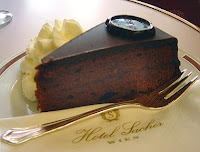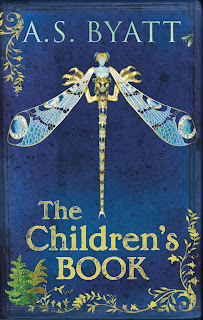The rules of the game are as follows:
1) The foodstuff must, obviously, appear in the book in question.
2) it must be mentioned by name.
3) Preferably it should be described in some way.
4) Bonus points if the description is sexually delicious.
5) I really do have to take pictures of it. Google images will not do.
The first food-centric book on my list is Death and the Maiden, by erotic pastry writer extraordinaire Frank Tallis. I've written before about Frank Tallis's probably very Freudian relationship with cake, and also about how reading his books makes me want to go bury my face in the front window of a Patisserie Valerie.

So I went with the Guglhupf. It is described in Death and the Maiden, with masterful brevity, as
a sponge slice, sprinkled with icing sugarWhich is perfectly delicious sounding, but not particularly helpful to someone actually trying to cook it.
Now, I've been fascinated by Guglhupf for quite a while. It keeps coming up in Austrian-themed books, quite mysteriously. No one seems to ever quite be able to describe what it is, although it is unanimously seen as A Good Thing. It turns out, once I began to scan Google for recipes for it, that no one on the internet can agree on the recipe for it either. Sometimes it has chocolate in it, sometimes it doesn't, sometimes it has orange juice and raisins and rum, often (but not always) it has almonds, sometimes it is made with icing sugar and, most interestingly, sometimes the recipe calls for yeast. This, I think, is the important thing, since when I went onto Wikipedia in desperation I discovered that -hupf means jump. A jumping cake! I like it.
In the end I went with a recipe without chocolate (since I think that would be Schokoguglhupf and slightly different) and with yeast: basically, this one from Food.com but without the almonds (I hate almonds) and with more sugar (Guglhupf can be savoury sometimes, and that is fine for other people but very definitely Not What I Was Going For). Yes, it's in American, but proper cup measures are fairly easy to find in England these days and if you don't have those there's always the miracle of Google.
So, in the name of Science, here's my modified Guglhupf recipe.
1/2 cup milk
2 1/2 teaspoons active dry yeast
2/3 cup unbleached all-purpose flour
Cake part
1/2 cup raisins
1 tablespoon dark rum
6 tablespoons unsalted butter, softened
6 tbsp sugar
1/2 teaspoon salt
2 teaspoons grated lemon zest
1 teaspoon vanilla extract
2 large egg yolks
1 1/3 cups unbleached all-purpose flour
| BUTTER |
Heat the milk in a saucepan until it is lukewarm. This took an astonishingly short time - I ended up overheating it and then having to wait for it to cool down. Basically, ten seconds will do it. Pour the milk into a bowl, add the yeast (2 1/2 teaspoons turns out to be one of those little Hovis fast-action packets, so save time and just chuck the contents of one of those in), stir it about and add the flour. Cover with clingfilm and leave in a warm place.
| Rum raisins. Excellent. |
MEANWHILE! Add the rum to the raisins in a bowl and let them sit. I'll be honest, I added more than a tbsp of rum - it seemed somewhat stingy. I like rum.
Watch 20 minutes of Celebrity Masterchef. Return.
| Fluffy yeasty bit. With lemon. |
Watch 10 minutes of Celebrity Masterchef. Return.
| Dough. Buttered. |
At this point, the recipe says
Scrape the dough into a buttered bowl and turn it over so that the top is buttered.I find this direction confusing, mainly because it seems so deeply unnecessary and also makes me have to wash up another bowl. I did do it, but I suspect the cake would be OK without it. Now cover this new bowl of yours with cling film and leave it in a warm place to rise again. (There is a lot of rising in this recipe. Definitely not one for the temporally challenged.)
| NOT RISING |
Scrape your batter into your mightily buttered cake tin, then cover with a tea towel or some buttered (!) cling film (what is it with this author and buttering things?). Then leave in a warm place 'until it is doubled'. The recipe helpfully makes no mention of how long this should take, and 30 minutes after I first left it IT HAD NOT RISEN AT ALL. I got so desperate that I put it on my desk so it could get the sun. Unfortunately this did not seem to do anything for it.
| Ready to be ovened. |
| Out of the oven. |
And there you have your Guglhupf.
I'm sure it was because I abused the yeast in some unknowable way, but I am a bit sad at how very un-hupfy my Gugl turned out. It seems to make the time I spent sitting about waiting for it to rise slightly futile, in retrospect. This Schokoguglhupf recipe seems much more achievable (whipped egg whites instead of yeast) and I may try it for contrast some time.
| The not entirely romantic reality |
Anyway, a tasty if slightly perplexing recipe, and one that convinces me more than ever that Austrian baking is Where It Is At. And now this book is most definitely on my Christmas wish list. (I bet Frank Tallis would like it too. You know, in case you were trying to find a present for him. Which you might be. I don't know your lives.)











